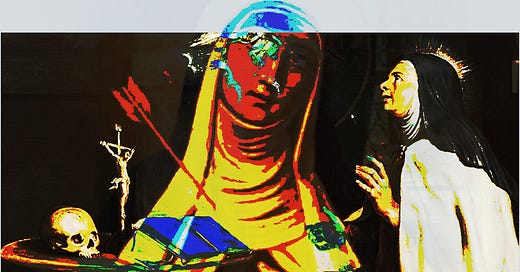The God Adventures: The Interior Castle
Junkyard, Pessoa and a St. Theresa of Avila
The god adventures.
Some of my char cross circuit in god adventures, outgrowth of Neil Gaiman and other American writers, including Campbell, Dylan and Pynchon, my circuitous routes aflush with Aristotle Leibniz Archimedes on the prowl.
As well now, as Cioran and Pessoa.
Junkyard dogs dont mind prowlers — in some way who shows up makes all the difference.
Sometimes it’s not so much about what someone does for you, as how much you get out of it.
In a way I am still hanging with Pessoa over god adventures — he is very alert, but has a distance to it — that is curiously outside of — looking in.
I have others which at same time are inside of it — old new and indifferent — looking out.
I call it god adventures.
Let the immediacy of our latest gods — and there are a bunch of them, and they remain of many different types (including seductions in what they are, coming out of engineering and math) — I let them ALL spread at points of crossovers with affection.
I admit to being influenced by Franklin, Poe and other Masons. For some reason I think of Poe as something of a Mason, criss crossed with Newton and Blake, go figure.
Hog ownership of all that, as possessed like in French — se faire to make oneself, sa propre what is one’s own —
Both in and out — with virulent affection.
st therese d'avila
A famous woman Spanish saint, au cause de Coiran and Bataille came to my attention. She has had huge impact on both of them. Shit Emily has a huge impact on Coiran.
Both Coiran and Bataille bring her up in their discussions about being, interiority and religion — mansions of the soul — She wrote a book called in English The Interior Castle, aka The Seven Mansions of St. Teresa of Avila.
French movies are poetically philosophically fibered as a kind of intercourse in discussion of god, being — nothingness and sex and romantic fascinations with medieval worship, of beauty and the chase.
Cioron and Bataille both engage with her and quote her, about interiority as a religious experience, of itself, including her comments on darkness, nothingness, and god.
I am presently researching her. For the same reason they did? Sure thing. She’s available on Internet Archive in English. She is also enshrined openly by the Catholic Church and they have it seems numerous commentary books on her.
Portuguese/French/Spanish
I am following up on it specifically with Pessoa in my mind.
As there seems to me to be a merge between Pessoa and the French, Gotta wonder if Beckett ever read her. Not as far as I know — no mention of her in his library.
Except that she is Spanish?!!
Most literature in spanish that I am famliar with, all in translation except Neruda, comes from the Americas. Well except Cervantes….
Pessoa’s ideas about remoteness of god — because he also lets go of being, at the same time that he doesn’t —
Aquila looks into philosophical aspects of darkness and the devotional that finds in darkness its emptying of all things mortal for divine, a place that crosses out into the nothingness, release from time — as a religious splendor.
With Pessoa its a bit more quirky and reflective.
But in me it’s almost equal measure — the ins and outs. And I fell in love with finding in him a release, something of a graphic relief in ideas about god —
At time of my discovering him, it was more for me — about feeling stuck, worse than stuck, cursed to beineg “kept in line” with views on god that were Middle Eastern, Eastern European and Christian Baptist too —
I was seeking release from.
Where god commands, the kingdom in heaven our lord and all that — also call deep Medieval (stinky) leftovers, where spirit and god are connected to heaven as a possessive, almost circumference of faith, the kingdom of god — as an observance of faith…
And I was finding ways out, in my god adventures, to an access other ways of thinking and exploring — Including mechanical usages for the infinite in metaphysics — As it blurred through to that feeling of the mystic in the mist — as a right to exist — as patently other.







the space inside me where god once might have been is curious again. i admire your brain.
Thank you for writing this and much appreciation for translating Cioran’s notebooks. Great line from the 1960 notebook: “As lonely as an unemployed God.”